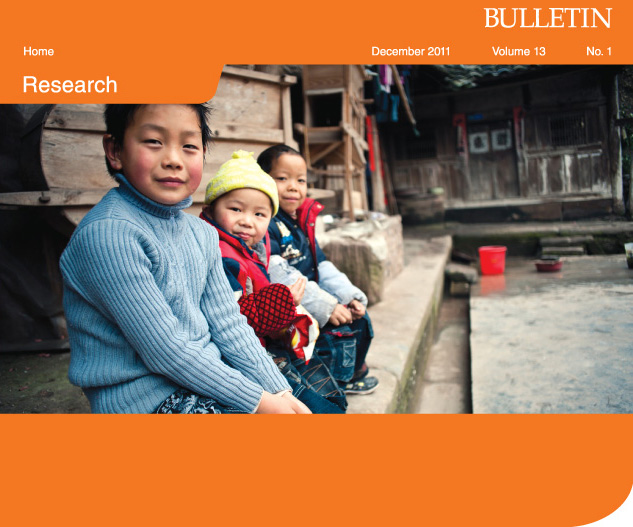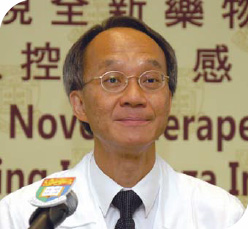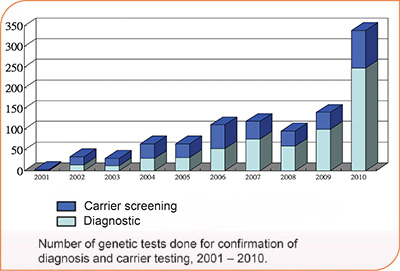
|
The genetic diagnosis of a whole host of Primary Immunodeficiency Diseases (PIDs) is bringing relief to thousands of children and their families. Although not strictly 'new' diseases PIDs are often categorized as such because they have only recently been identified and new ones are emerging every year. But thanks to advances in genetics the causes of many of these diseases can now be pinpointed allowing the adoption of a fresh strategy in their management or treatment. Leading the way in this genetic diagnosis is Professor Lau Yu-lung, Doris Zimmern Professor in Community Child Health and Head of the Department of Paediatrics and Adolescent Medicine in the Li Ka Shing Faculty of Medicine. |  Professor Lau Yu-lung |
|
He says many of these children are born with a defective immune system. "Over the last 20 years a lot of the genetic causes have been discovered and now it's very important to make a very precise genetic diagnosis because that will have an impact on how we manage and treat the patient." "There are over 150 such genetic forms so it's not easy for any one unit or hospital, or even one city like Hong Kong, to do it alone." A strong network In view of this Professor Lau has established a network that tries to promote an accurate genetic diagnosis for this group of children. Following an e-consultation with paediatricians from around the region who are caring for children with recurring infections, he offers them free genetic testing which is supported in part by the Society for the Relief of Disabled Children. "In the last few years I have had a number of consultations from about 40 units, dotted around Mainland China, Taiwan, Malaysia, Singapore, the Philippines, Australia, and even South Africa. These doctors send me e-mails to discuss their patients. Then they fill in the request form and send us a DNA sample. We analyse it and send them the results. "This has a big impact on how the patient is able to manage. This is not science in the sense of discovering new things but it is very important in that it brings new hope to these children who are not really being looked after as well as they should be, or as well as they would be in Europe where they have a very good network." Professor Lau started the PID service in 1988 after returning from the UK and over the last 23 years has gradually built up a core group of members who are interested in these types of illness. "Twenty three years is not a short time," he says. "So there has been enormous scientific progress – over 50 genes can now be tested in our Department of Paediatrics and Adolescent Medicine." Tests for families He offers the test not only to the patients but to their families as well so they can establish whether they are carriers of the genes or whether their next pregnancy might be affected. "There are very severe and less severe types of PIDs," he explains. "Some are so severe that the child might die in the first year or two unless they have a bone marrow or stem cell transplant. Some will remain at a very low level of quality of life with repeated infections, some might develop malignancies or rheumatological problems, and severe allergies. Many may die in the first ten or twenty years of life. Those that do grow up may not be very well, they may be handicapped." It is estimated that 3,000 children are born with PIDs in China while in Hong Kong the figure is around 20. "It is only with a correct diagnosis that the latest treatment can be offered. In the past in Mainland China these children would die, but now that China is getting richer and the parents have only one child they can afford to seek definitive diagnosis and the best treatment for that child." Accurate diagnosis However, establishing an accurate diagnosis is often difficult, and this is where DNA testing is vital. "China is old, and these diseases are considered new because many of them are only now coming to light, or only now receiving an accurate diagnosis. So in a sense they are new diseases in an old country." "It's also a new disease in the sense that scientists keep adding more to the list every year, new diseases are defined annually. Lately we have embarked on a quest to find new PIDs by whole exome sequencing. |
"In the past in China many of these children would have died from pneumonia, malnutrition or diarrhoea. It's important to have a name and it is my belief is that you must have an accurate diagnosis because then no-one can shun the responsibility of offering the best treatment to these children." "If they get adequate treatment they can grow up to go to university but without adequate treatment they will suffer complications such as arthritis and die a horrible death." For Professor Lau it all comes back to social responsibility. "It's also about what a university should strive to become," he says. |
 |
| Back | Next | |